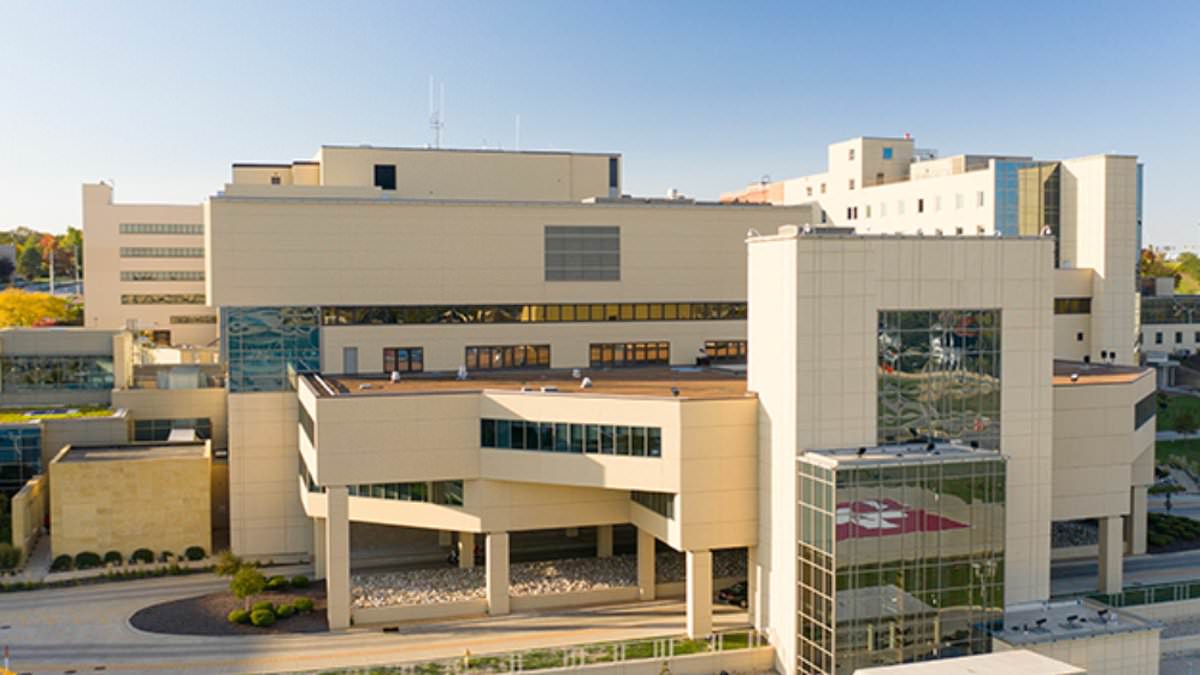An Illinois mother was slammed with a hefty hospital bill of $445 for her toddler who never made it past the waiting room of their local emergency room.
Maggi Wettstein was forced to rush her daughter Ryan Wettstein Nauman, 3, to Carle Health Methodist Hospital at around 10.30pm on December 19 over fears of an infection after hours of crying.
On arrival, the frantic mom noticed that the emergency room was mostly empty and quickly got the child checked in.
Medical records state that Maggi had explained Ryan’s symptoms, which included an intermittent fever to hospital staff at the time.
The toddler was triaged and given a nasal swab test to check for Covid-19 and influenza A and B, according to KFF Health News.
The mother and daughter then sat down in the hall, and waited to be called upon for hours.
At one point, Maggi realized that the toddler had stopped crying and seemed to be happily enjoying herself in the room’s playing area.
A little more at ease, Maggi decided to drive her daughter home and monitor her symptoms which would come with the benefit of avoiding a lengthy ER bill.
Maggi says there was no staff member present at the check-in desk to inform that they were leaving.
But in October 2024, Maggi was shocked to receive a bill of a staggering $445 for the combined Covid-19 and flu test form the hospital.
After insurance coverage, the bill fell to $298.15 but the price seemed remarkably high considering at no point during their short visit did they see a doctor.
Maggi, who was unable to remember whether Ryan had been tested, quickly asked for her child’s records and discovered that she had tested negative for all infections.
She said: ‘The fact that I never saw a provider and the fact that it was just for a Covid-19 test is mind-blowing to me’.
In contrast, an at-home Covid-19 test and/or influenza A/B rapid test from Walgreens costs anywhere between $25 to $30.
Similarly, a Flowflex Plus Covid-19 and Flu A/B home test from CVS costs $12.99.
Soon enough, Maggi contacted the hospital’s billing department to confirm the amount and spoke to a hospital representative, who was left as shocked as her after hearing the story.
‘Don’t pay this until you hear from me,’ Maggi recalled being told.
But shortly after, she received a letter from the hospital stating that the charges were correct and supported by documentation.
While Maggi had assumed that she was avoiding any big charges by taking Ryan home without being seen, she instead received a bill ‘that they have verified that I have to pay’.
‘Like I said, it’s mind-blowing to me. I’m not going to create a habit out of going to the emergency room,’ she further told KFF.
Loren Adler, a fellow and associate director of the Brookings Institution Center on Health Policy, told KFF Health News: ‘That’s a pretty healthy markup the hospital is making on it.
‘[The hospital] is utilizing their market power to make as much money as possible and the insurance companies are not all that good at pushing back’.
Brittany Simon, a public relations manager for Carle Health Methodist Hospital told the outlet in a statement: ‘We follow policies that support the safety and wellbeing of our patients, which includes the initial triage of symptomatic patients to the Emergency Department.’
This comes amid concerns about a healthcare trend causing a ten-fold rise in some patient’s medical bills.
Danielle Ofri, a primary care doctor at Bellevue Hospital in New York took her daughter to what she thought was an urgent care center in Chicago, hoping to get a quick X-ray after a bicycle accident.
Weeks later she received a bill for $1,168 and discovered that the clinic was owned by a hospital that tagged on hundreds of dollars for ‘facility fees’.
‘It turns out that I’d stumbled into a lucrative corner of the health care market called hospital outpatient departments, or HOPDs,’ she told the NY Times.
‘Since these facilities don’t necessarily look like hospitals, patients can be easily deceived and end up with hefty financial surprises.
The hospital-owned clinics carry out the same routine procedures as independents but are allowed to charge higher prices.
The average charge for a colonoscopy is $1,383 at a HOPD, compared $625 at a doctor’s office according to a study by the National Institute for Health Care Reform.
